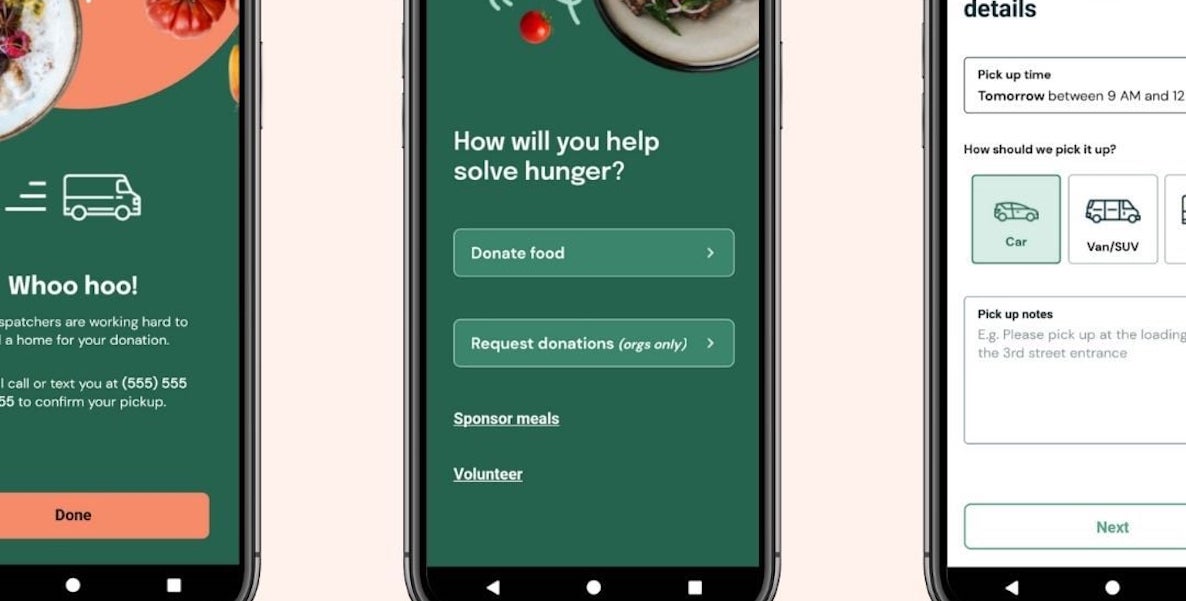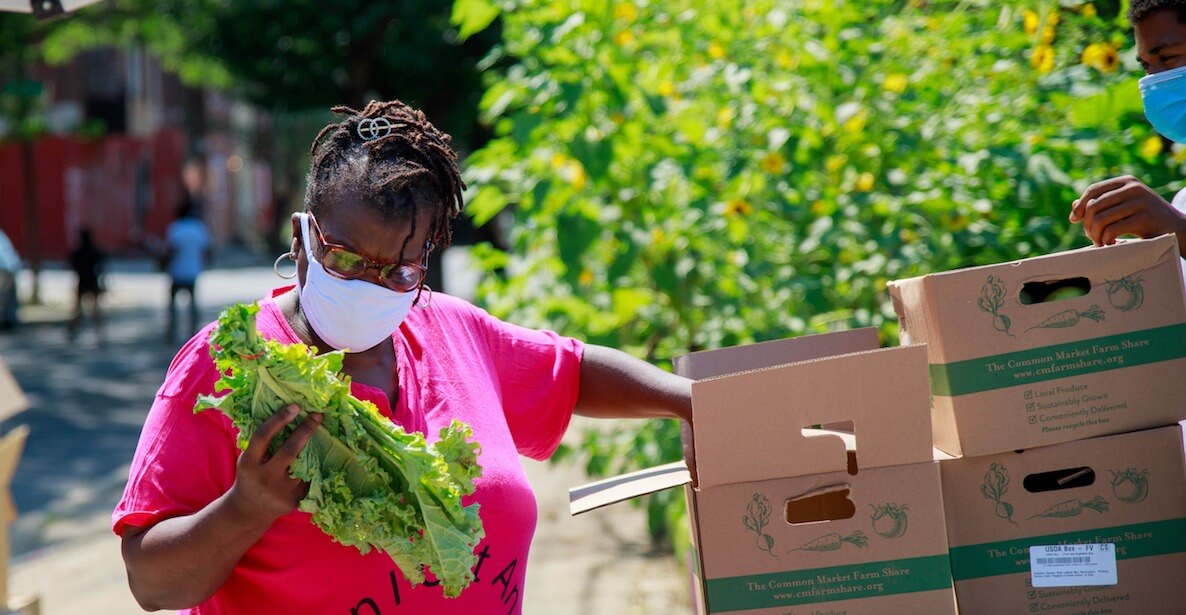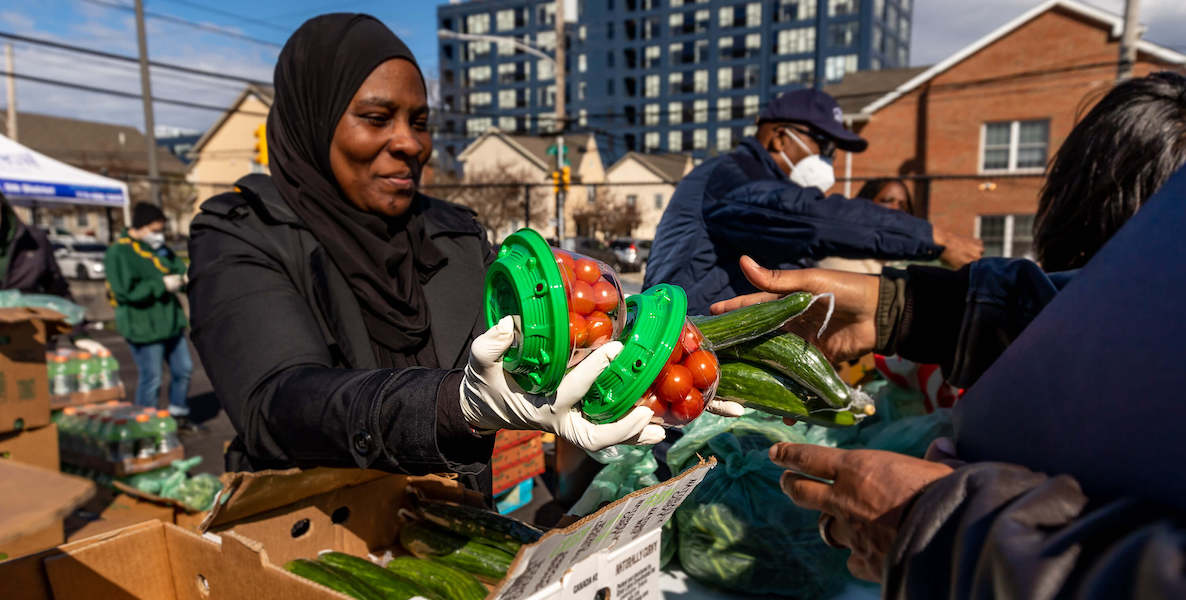Philadelphia is in the middle of a food insecurity epidemic. According to a 2018 report from Hunger Free America, within our city, roughly one in five people — that’s 330,000 of us — lack regular, reliable access to daily meals. The food insecurity rate in our city is higher among children, too. In 2019, Feeding America calculated that 1 in 4 children were food insecure: a number that amounts to almost 84,000 kids.
Note that this percentage was pre-Covid. The pandemic unquestionably worsened food insecurity rates across the country and forced food banks and other organizations to adapt.
In Philadelphia, countless agencies and organizations continue to step up to address the problem, getting food to people who need it while adapting to ever-changing circumstances. These organizations can use your help.
Keep reading for all kinds of ways you play a role in helping make sure that Philadelphians who need food can get it right now.
![]()
1. DONATE FOOD
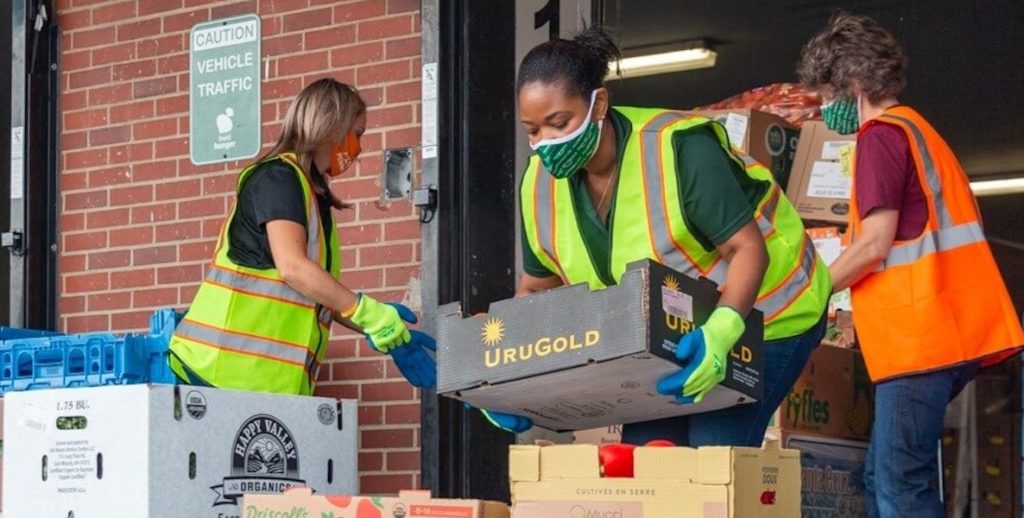
Local food banks provide thousands of meals each year to needy Philadelphians, but rely on donations to stock their pantries. If you have extra food items, consider donating to an agency near to you — or, if you’re able, pick up some items to give away the next time you’re at the grocery store.
You can find a great list of local food banks at the Coalition Against Hunger site. The site allows you to filter by food pantry and soup kitchen, indicates whether a site is handicap accessible and lets you know what days of the week certain food banks are open. Phone numbers are provided and can be used to inquire about needed items.
Meanwhile, longtime Philly food distribution agency Philabundance also features a map of its many partnering agencies (though you can also make an appointment to donate directly to the Philabundance warehouse, which then distributes donations). Their website offers a list of most-needed items, such as peanut butter and jelly, canned fruits and vegetables, and pasta.
Make sure that you are donating items that are needed — it is helpful to call and ask what is — and check to ensure food isn’t opened or expired. During holiday times, consider donating special foods if able (think turkey, etc.). Remember: just because someone is food insecure doesn’t mean they shouldn’t be able to have choice in what they eat — a donation of a sweet treat or an allergy-safe food goes a long way.
2. USE AN APP TO SCHEDULE AN EXCESS FOOD PICK-UP
Download the Food Connect app on your phone to schedule a pick-up of any food items you want to donate. Just type in your name, address and how much food you want to donate, and someone will come by to pick it up. It’s that easy! Food Connect partners with organizations such as Philabundance.
3. DONATE MONEY TO A FOOD BANK OR PANTRY
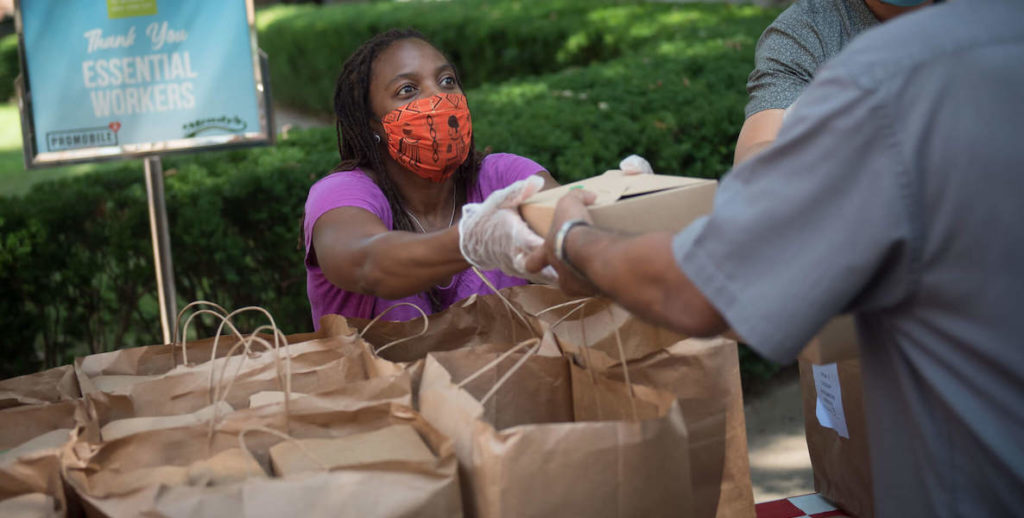
Philabundance points out that your $20 bill will provide 40 meals for those in need. The Sunday Breakfast Rescue Mission says $50 will supply one of its guests three full hot meals on Thanksgiving day (plus services like showers and laundry).
The Food Bank of South Jersey notes that $35 a month provides 1,260 meals a year. And the Share Food Program — which already serves some one million Philadelphians a month—is currently expanding its food distribution footprint to work with more and more community partners.
In North Philadelphia, the Northwest Mutual Aid Collective works to support smaller organizations and community fridges (more on that below). There are also opportunities to donate items from Amazon and Walmart wishlists as opposed to cash or food donations.
The point is this: Your money can go a long way in terms of immediate impact on hunger.
4. AND SUPER-CHARGE THAT CASH DONATION
Ask about a donation-matching program at your place of employment, which can be a simple way to double or even triple your giving to organizations working to fight Philadelphia food insecurity. There are also ways to donate through your will, through gifts of stocks or bonds — even with cryptocurrency.
5. GIVE YOUR TIME
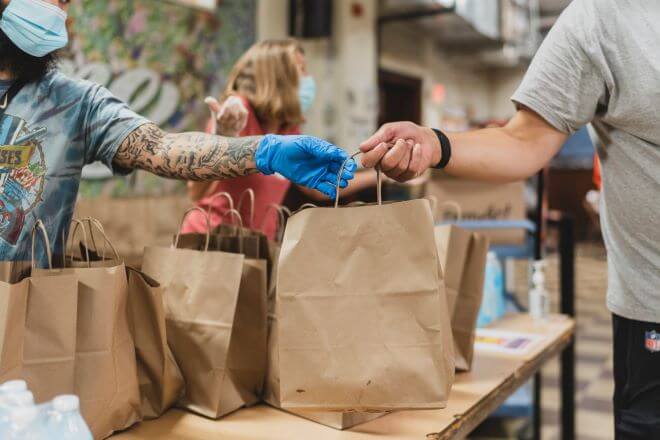
Consider volunteering at local food banks and pantries to help sort and distribute food to those who need it. (If you want to stay in your ‘hood to do it, you can find and call your local agencies using this guide.)
You could also work directly with local hunger-fighting organizations that specialize in different types of programs (e.g. handing out sandwiches, organizing outdoor food distribution, serving restaurant-style meals, delivering meals to seniors … ). Organizations may also need help with cleaning or maintenance tasks.
Check out organizations like Fooding Forward, Sunday Love Project, Broad Street Ministry, the Mitzvah Food Program, D.O.P.E. (Doing Our Part Eclectically), Welcome Bread, or Caring For Friends (to name a few!) to help package, serve or deliver food to hungry people across Philadelphia.
6. CHOOSE THE RIGHT MOVER
Are you moving? The New Jersey nonprofit Move For Hunger works with moving companies across North America — including many here in the Philadelphia region — to pack up any food that you aren’t taking with you and deliver it to a local food pantry. All you have to do in terms of effort is to hire the right firm. Quoth their website: “Why is this important? Because 33 million Americans move every single year. If we recovered just 1 pound of food from each of them, we’d be able to provide 27.5 million meals to families struggling with food insecurity.”
7. ORGANIZE A FOOD DRIVE WITH FRIENDS
Food drives are something anyone — in any community — can put together. It can even be fun to partner up with pals on one. That’s something else Move for Hunger wants to help with. Check out its Food Drives 101 page to learn how to organize a community food drive. (You can also simply give them a call if you have more specific questions.)
The food bank of South Jersey also has info on and tools for hosting impactful virtual food drives, as does Philabundance, while the Coalition for Hunger even offers tips for hosting healthy food drives.
Students: this is a great way to make an impact. Consider hosting a food drive with your club at school, or with your sports team. You can even make it a contest to see which grade, for example, can donate the most cans — an easy way to make giving back fun.
8. HELP END FOOD WASTE
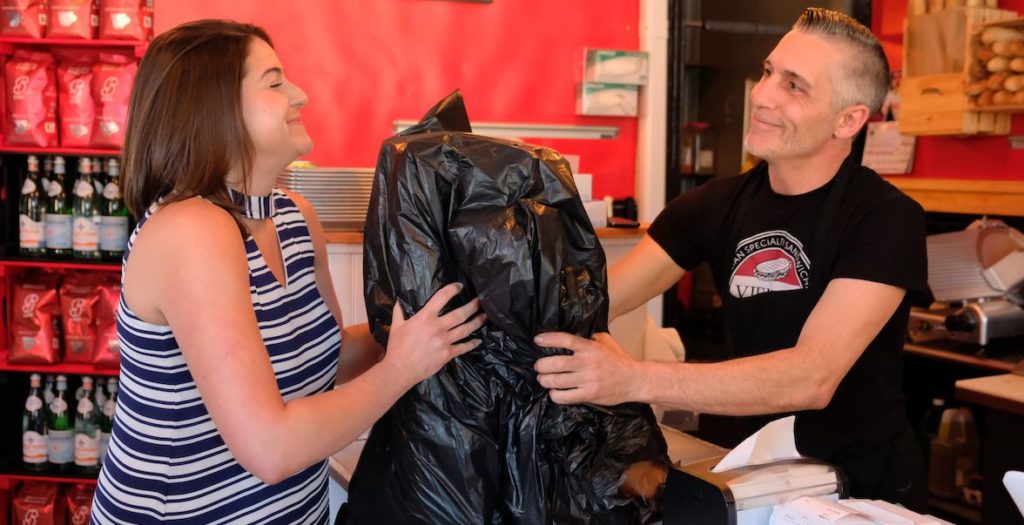
In Philadelphia, an estimated 20 percent of edible food goes to waste, and and according to the City Office of Sustainability, restaurants and caterers account for more than a fourth of this waste. This is what led Abbe Stern to start Fooding Forward, an organization that helps restaurants and hotels in Philadelphia put excess food to good use.
Stern says the best way to help is by volunteering at any of these organizations; distribution and transportation needs in particular have shot way up. Of course, you can always donate money to keep all of the many wheels turning, too. If you don’t know where to start, you can go to the Fooding Forward site and enter your contact info as an interested potential volunteer or donor. It can always help to support restaurants that donate to Fooding Forward by eating at them!
The City of Philadelphia has also published food waste reduction resources which can help reduce your food waste at home or work. And, if you are getting married or using a caterer for an event, come up with a plan for all of your extra food — most times, there is a lot.
Food waste also has other negative impacts, too. Think: extra waste sent to landfills requiring more energy for processing. Reducing your food waste helps everyone.
9. HELP STOCK COMMUNITY FRIDGES
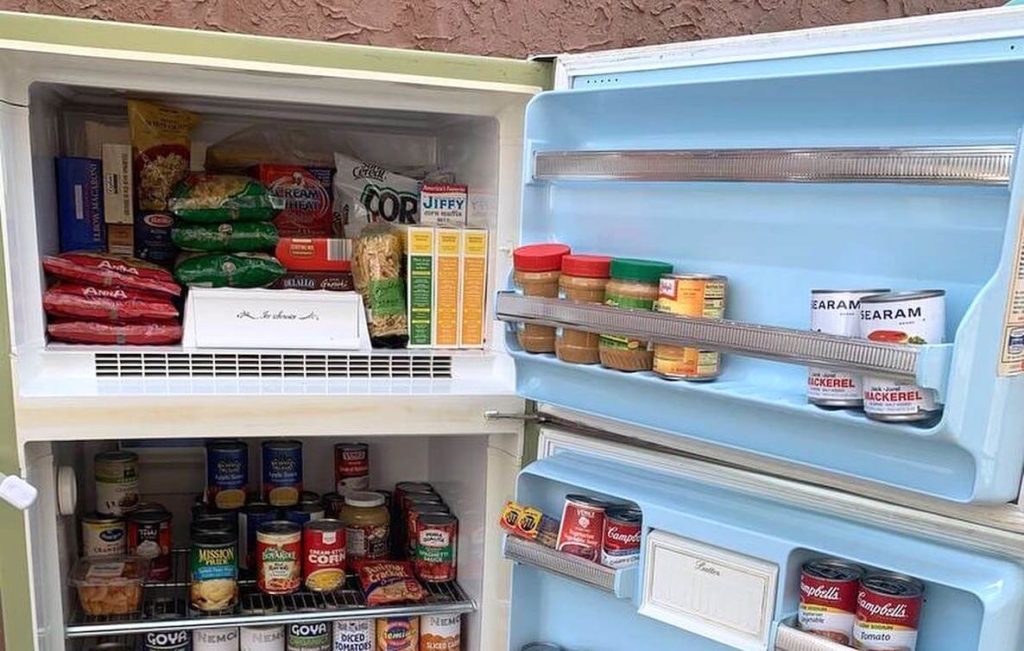
Community fridges are exactly what they sound like — fridges (okay, and pantries) that are both stocked and used by the community around them (and they can be used and stocked by literally anyone. Over the course of the pandemic, more and more community fridges have popped up in neighborhoods around the city—from South Philly to Germantown to West Philly to the Northeast to Fishtown and beyond.
Run by various individuals and groups, the fridges are usually powered by local businesses who offer up an outlet; the food comes from community members who have it to donate, or who shop to stock it. Most of the fridges’ websites or Instagram accounts (linked above) offer information on how to get involved. Many of these fridges will reimburse community members who grocery shop for the fridges, and rely on volunteers to clean and organize the fridges as well.
These fridges rely on a concept called mutual aid which centers around the principle of doing things for mutual benefit of all without strings attached. Within mutual aid, community members work to better their communities and challenge existing systems.
Thinking about starting your own fridge? Here is a guide on how to start your fridge within your neighborhood.
10. DO SOME COMMUNITY GARDENING
The produce plucked right out of the garden is not only fresher and often better tasting than what you find in a produce aisle, but growing food in our communities is an effective way to help solve Philadelphia’s problem of food deserts. Use this map to find a community garden near you: In many cases, you can volunteer. Or, if you find that Covid has brought more time or altruistic ambition into your life, consider starting your own community garden. Here’s a good guide on how to get started in Philadelphia.
11. SUPPORT URBAN GARDENING BY BUYING FROM THE RIGHT PLACES
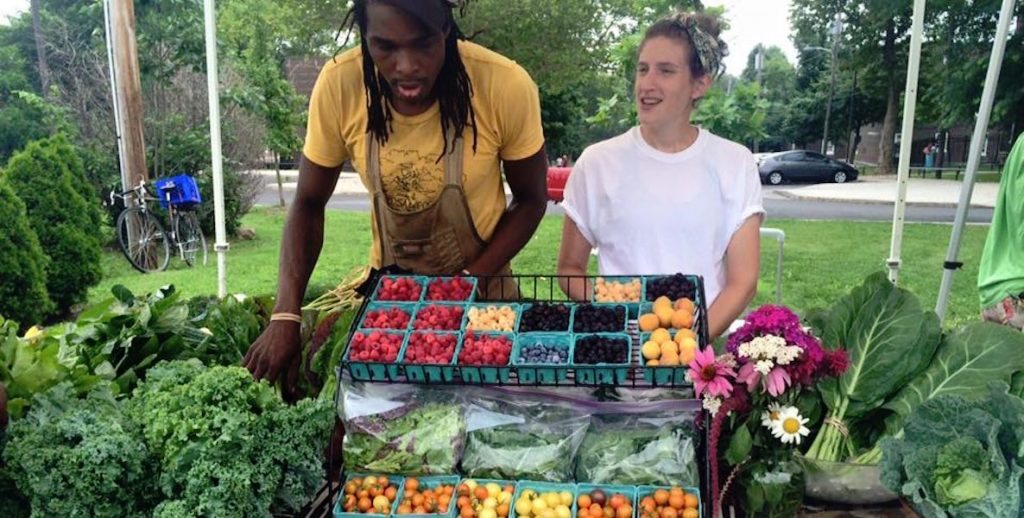
Does the thought of doing your own garden seem daunting? You can still help further the cause by purchasing fruits, vegetables, cheeses and meats from some of the urban farms working to fight food insecurity in Philadelphia, such as Greensgrow in the Kensington area, the Sankofa Community Farm at Bartram’s Garden and Weavers Way with farms and stores throughout northwest Philadelphia. Farmers’ markets are a great place to start, too. Find one nearest you with this map by The Food Trust.
12. WORK THE PHONES
As we’ve previously noted, the Coalition Against Hunger offers a variety of volunteer opportunities to help the hungry in Philadelphia get the nourishment they need. One especially helpful job you can do for them is on the administrative side of things, helping man the phones to aid fellow citizens in signing up for Supplemental Nutrition Assistance Program (SNAP) or to help them find a nearby food pantry or kitchen. This can be especially helpful for senior citizens or for those who speak English as a second language.
WhyHunger, a national organization that works to support small organizations combatting food insecurity also needs help making calls. They are looking for volunteers to make and answer calls to support their mission. This is a great way to help out — without donating anything or even leaving your own home.
13. LEARN MORE ABOUT FOOD INSECURITY IN PHILADELPHIA
Donating and volunteering are clear and immediate ways to help the hungry in Philadelphia, but it also helps to have an understanding of the underlying causes of food insecurity in our city. Broke in Philly is a collaborative reporting project that works with 20 media outlets — including The Citizen — to support journalism about solutions to hunger, poverty and the city’s push toward economic justice. Follow them to stay abreast of the reporting they’re doing.
Feeding America provides resources about food insecurity and also provides a resource guide on how to talk to your kids about hunger.
14. CONTACT YOUR ELECTED OFFICIALS
It’s hard to move the needle on food insecurity in Philadelphia without the help of our elected officials and their resources. Have an idea or proposed bill that you’re passionate about? Take the time to contact your City Council rep or Congress member to let them know.
15. GIVE TO SOMEONE WHO IS HUNGRY
Consider how much your last cup of Starbucks cost. For that — or probably much less –– you could buy food for someone on the street. (After all, Wawa has prepared foods, pre-packaged foods, water, milk, coffee, veggies … You name it.) Sometimes it’s the slightest gestures that make the biggest difference.
Header photo by Jared Piper / Philadelphia City Council


